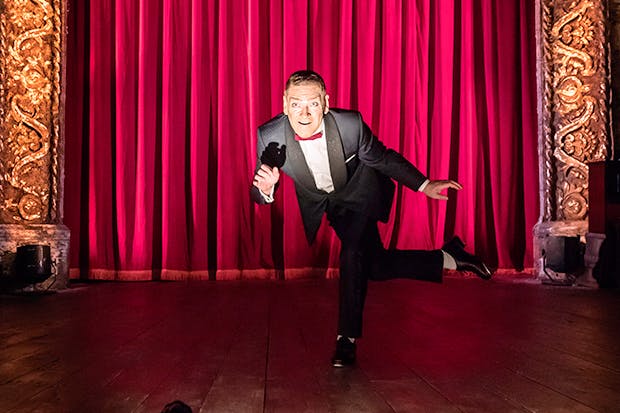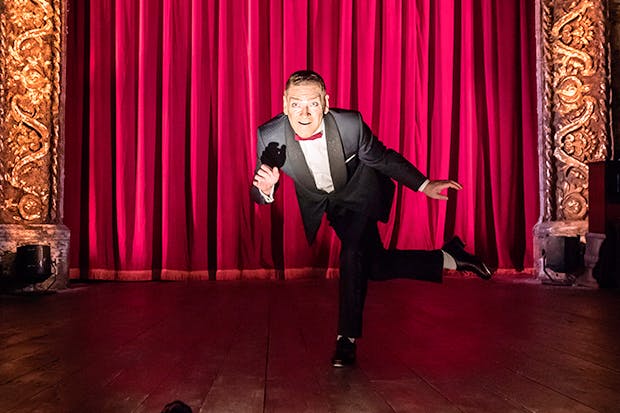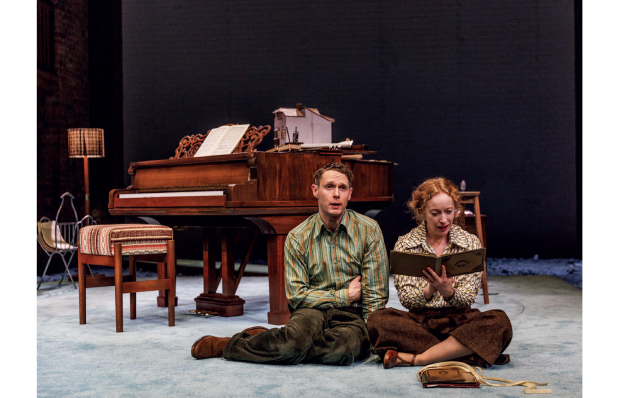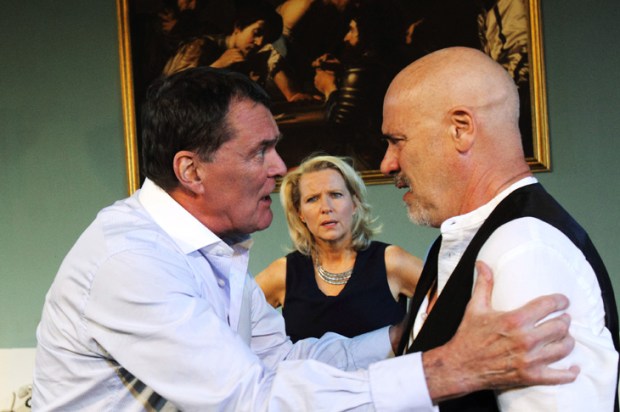Kenneth Branagh’s obsession with Larry Olivier’s career is becoming such a bizarre act of theatrical necromancy that it deserves to be turned into a drama. Sir Ken and Lord Olivier could be played by the same actor. The Entertainer, written for Larry in 1956 by John Osborne, presents us with a washed-up music-hall star, Archie Rice, who is supposed to symbolise Britain’s post-colonial decline.
This version, directed by Rob Ashford, opens with a tap-dancing routine so ponderously executed that it leaves one wondering if Branagh is a lousy hoofer trying too hard, or a master of the art impersonating a lesser practitioner. This difficulty permeates the piece. By making the central character a useless comic, Osborne has sabotaged the play as an act of entertainment. If the lead performer can deliver a bad gag ineptly and garner a few reluctant titters from a bored audience he has, amazingly, fulfilled the highest demands of the script. Big-hearted Branagh is a natural charmer and he brings some real human sparkle to the seedy, superficial role created by the dyspeptic Osborne. Archie Rice is a junkshop of masculine frailties: a fast-talking, hard-drinking, tax-dodging, wife-discarding, narcissistic, loudmouthed wide boy whose sole redeeming quality is his bonhomie.
Osborne’s great skill, bilious rhetoric, is the aptitude of the orator rather than the dramatist. His characters are animated by suffering, or by self-pity to be precise, but they never seem to grow or change. A good dramatic personality, like a good pie, emerges from the furnace in a radically altered state. But not Archie. The plot presents him with three problems — tax arrears, a needy mistress and a son in danger overseas — and they all develop in foreseeable ways. When he receives news of his bereavement, Archie responds by performing a blues number for his family’s delectation. Is that meant to be poignant? It seems tactless and self-regarding. After the funeral, he returns home in a mood of mustn’t-grumble chirpiness as if he’d just wasted a shilling on a disappointing Victor Mature flick at the Odeon. He can never develop as a human being. He’s too busy jabbering.
Ditto the supporting cast of numpties. Gawn Grainger plays Archie’s dad as Archie with the volume turned down. Greta Scacchi gamely impersonates Archie’s gin-sozzled, pea-brained wife fussing and wittering around the table like an upright dishcloth miraculously granted the powers of speech (but not of thought).
When it first appeared, the play was hailed as prophetic. Now it’s as brackish as old Brylcreem. Osborne’s prediction that the music hall would expire proved incorrect. Comedians like Bruce Forsyth, Ken Dodd, Max Bygraves etc. transferred their skills to the small screen and made their fortunes. And the same medium has since supplied urban wage slaves with oodles of weekly drama about their personal experiences. Which is exactly how this play feels: a big, fat, boring slice of prime-time chitchat. The Rices are just a pack of sentimental, down-trodden halfwits yapping about their problems like modern regulars of the Queen Vic.
A more noteworthy act of salvage has been achieved by the actor/director Hugh Ross. J.B. Priestley wrote The Roundabout in 1931 and he seems to have promoted it with insufficient zest. It’s a beautiful, witty, low-key comedy of manners set among the English aristocracy. An impoverished toff’s house party is turned on its head by the appearance of his long-lost daughter, Pamela, fresh from a trip to Soviet Russia. She wears a peasant’s belted smock and has a hilariously mirthless intellectual, Comrade Staggles, in tow. Pamela soon changes into a glamorous dress and sets about installing herself as the châtelaine of her father’s household. Comrade Staggles, meanwhile, tucks into his lordship’s brandy while predicting the downfall of capitalism. When the butler calls him ‘Sir’, Staggles forbids further use of the term on the grounds that everyone is equal. Butler: ‘If we’re equals, I can call you what I like … [beat], Sir.’
Priestley has great fun mocking his cast of eccentrics and schemers. There’s an optimistic bankrupt, a closeted gay boulevardier, an impoverished dowager who fixes deals for nouveau-riche clients and a calculating divorcee with her eye on his lordship. Hugh Ross adroitly directs a terrific cast and he deserves high praise for recognising the script’s potential when he discovered it among his late father’s effects. This is the first production in London. More will follow. And not just on the professional stage. Am-dram clubs seeking an overlooked gem should note that the design requires very little furniture (the rest has been sold off to satisfy creditors), and the period costumes can be easily borrowed or bought cheaply from Oxfam. There are ten strong roles (5M, 5F) for actors aged between 20 and 70. What a treat to see a literary Perdita restored to her rightful place among the classics of English comedy.
Got something to add? Join the discussion and comment below.
Get 10 issues for just $10
Subscribe to The Spectator Australia today for the next 10 magazine issues, plus full online access, for just $10.














Comments
Don't miss out
Join the conversation with other Spectator Australia readers. Subscribe to leave a comment.
SUBSCRIBEAlready a subscriber? Log in